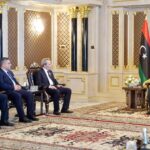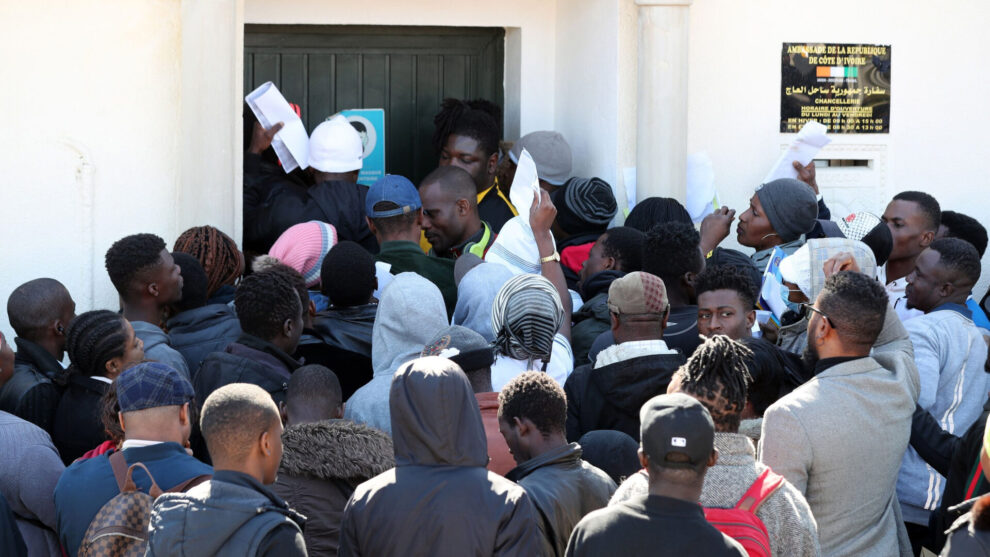Country’s interior minister has called images of dead refugees ‘fake’, as EU ignores criticism of migration deal with Tunisia.
The image of Ivorian woman Fati Dosso and her six-year-old daughter Marie, found dead in the Libyan desert from apparent dehydration after being expelled from Tunisia, continues to prove problematic for the European Commission and Tunisia’s President Kais Saied.
Under the terms of a memorandum of understanding the two signed with each other in mid-July, Tunisia will receive 105 million euros ($115m) to support five pillars of the “new chapter in relations between the European Union and Tunisia”, one of which is migration.
Tunisia’s migration policies have seen at least 1,200 Black refugees and migrants expelled to the desert regions along the borders with Libya and Algeria and there is no evidence that it will stop the mass deportations, irrespective of its agreement with the EU.
As the expulsions continued and racist attacks against Black people increased in the country, much of Tunisia’s mainstream media has remained silent.
Desperation at the border
On Tuesday, United Nations Secretary-General Antonio Guterres addressed the ongoing situation – which Avocats Sans Frontiers says breaches international laws – and demanded that the expulsions stop and those already in the desert be returned.
Translation: The Minister of the Interior accuses people (who?) of having made the images of migrants thrown into the desert, and these people would be “monitored by image and sound”. #Tunisia
Evidence gathered by NGOs and reporters reveals a desperate situation on the border. On Monday, officials at the Libyan Interior Ministry said the bodies of six more deceased refugees had been found – all of them appeared to have died of thirst.
A few days prior, reporters from the press agency AFP documented Libyan security services, or militias, intercepting hundreds of refugees and migrants, many near death, who all spoke of having been expelled from Tunisia.
While anger grows within parts of the European Parliament and across Europe over Tunisia’s brutal treatment of Black refugees and migrants – with one Dutch European Parliament member slamming Saied as a “dictator” – Tunisia has denied all allegations.
Speaking in parliament last week, Interior Minister Kamal Feki denied any knowledge of the expulsion policy, claiming instead that the country was the victim of “fake news”, adding that he knew, without specifying, who was behind the so-called doctored images.
Responding to the situation at the border, an EU spokesperson told Al Jazeera that while the organisation wanted Tunisia to improve its treatment of migrants, it would not retract its support for the country.
“We urge our partners to prevent such events from happening again and ensure that human dignity and lives are saved,” the spokesperson said. “This is not time to disengage. We are in contact with Tunisian authorities on this issue.”
“While migration management lies within the competence of sovereign countries, it needs to comply with fundamental rights, international human rights law and principles, as well as the principle of non-refoulement.”
Crackdowns and racially charged language
Alarm within Europe over Tunisia has been growing since the arrest of at least 20 of Saied’s opponents and critics in mid-February.
Those concerns mounted significantly later in the same month when Saied launched a racially charged tirade against irregular migration from sub-Saharan Africa, which he claimed, without evidence, was part of a plot to change the character and demography of Tunisia.
The violent pogroms that erupted in the wake of that speech have continued, with one member in the country’s parliament – refashioned and re-elected according to the president’s design – holding up a sign proclaiming unironically that, despite Tunisia sitting in the African continent’s north, “Africans are part of a plan to destroy the state”.
Monitors say that, despite the appointment of new Prime Minister Ahmed Hachani late on Tuesday, there is unlikely to be any change in the debate within the parliamentary chamber.
“It’s very hard to gauge the motivations for any parliamentarian,” Lamine Benghazi, board member of NGO Al Bawsala, which used to monitor the parliament but currently boycotts it, said.
“For some, they could be reflecting what they feel are the concerns of their constituents, or just riding a racist wave on social media. For others, they could just be seeking the president’s favour. We don’t know,” Benghazi said.
“What we do know is that we’re seeing an explosion in racism across the country since the president’s speech in February 2023; a wave of racism that finds an echo in an amateurish parliament with weak prerogatives and where political parties were simply excluded.”
The view from Europe
Thirty-seven European MPs from across the political spectrum have signed an open letter to European Commission President Ursula von der Leyen objecting to a deal they say is essentially “cash for migrant control”.
Translation: #Tunisia #Racism A member of #KaïsSaïed’s parliament with a sign reading “Africans are part of a plan to destroy the state through Sfax”
The MEPs say the deal has failed their core concerns over the deteriorating rights situation within Tunisia.
“[The] grave violations of the rights of migrants and asylum seekers as well as an escalation of restrictions on civil and political rights, will put the European Union policies at risk of contributing to or perpetuating such violations and enabling impunity of those responsible,” the authors stated.
Contacted directly, German MEP and former diplomat Michael Gahler told Al Jazeera in an email: “My criticism is that this package was purely motivated by migration considerations.”
Continuing, he recounted the continued European Parliament efforts to persuade Saied to engage in some form of national dialogue over the deteriorating economic and political situation after his power grab in July 2021, when he suspended parliament and removed the government. However, the European Commission chose to ignore those efforts.
“Since 2011, the EU has invested a lot in establishing Tunisian democracy,” he said. “But when the citizens and [Tunisia’s] democratic civil society and elected members on [the] national and local level needed our support, our executive bodies remained largely silent.”
“We’re seeing evidence of growing concern over the racist violence and collective expulsions of sub-Saharan migrants in Tunisia,” said Eleonora Milazzo, a joint research fellow at the European Policy Centre and the Egmont Institute in Brussels.
“This is why the deal has been subjected to such intense criticism, not just from MEPs but from rights groups. There’s no real scrutiny or any mention of migrant rights, or how they would be monitored,” she said.
The row over the deal between Tunisia and the European Commission has also drawn the attention of the wider European public, who are more used to imagining Tunisia as the sole democratic survivor of the 2011 Arab Spring and who have been surprised by the explosion in racist violence.
“Every study we see shows attitudes have not become more negative in the last years, however, those groups who are concerned are increasingly motivated and increasingly vocal,” Milazzo said.
“People are concerned… However, whether they’re more concerned about rights or migration remains to be seen. Italy entered a similar deal with Libya in 2017. Despite the overwhelming evidence of abuses and pushbacks, that deal still holds.”
In return for intercepting potential refugees and migrants at sea and returning them to Libya, Rome provided Libyan militias the financial and technical support that would allow them to police the North African country’s borders. In May this year, investigators for the UN accused the EU of complicity in funding the groups responsible for the “murder, torture and rape” of refugees and migrants trapped in Libyan detention centres.
But Italy appears keen on expanding the scheme, with both Morocco and Egypt singled out for similar deals.
Source: Al Jazeera
















